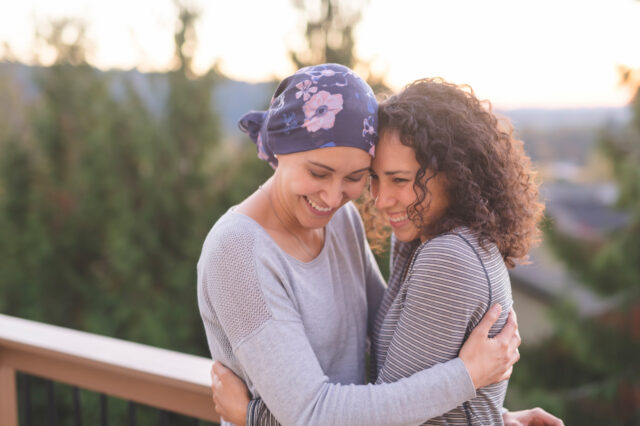Supporting a Friend or Relative with Cancer
According to the American Cancer Society, most survivors who receive strong emotional support adjust better to the changes in their lives and have an increased positive outlook on life.

Being diagnosed with cancer can be one of the most difficult, life-changing experiences a person can face. It’s even more difficult when it’s a friend or a relative and you can’t seem to find the “right” words to say. As friends or relatives, we want to help our loved ones through their cancer journey, yet we may not know how to provide support or comfort.
According to the American Cancer Society, most survivors that receive strong emotional support adjust better to the changes in their lives and have an increased positive outlook on life. The presence of friends and family can truly be meaningful, so it’s helpful to learn about support methods that could be well-received.
Tamara Sorrye, outpatient case manager of Cancer Services at UF Health Jacksonville, offers simple yet meaningful tactics to follow when offering to help those living with cancer:
- Be aware of your own feelings and emotions before offering support. It’s normal to have your own worries, fears and feelings of sadness when learning that a loved one has been diagnosed with cancer. It is important to cope with those feelings before you can help your loved one.
- Learn about the diagnosis. Organizations such as the American Cancer Society, Cancer Care and National Cancer Institute offer detailed information about cancer diagnoses.
- Listen, support and do not give advice if it is not asked for. Sometimes your presence and listening ear are all a person needs. If they ask for your advice, then it is fine to give it. If they don’t take it, support them in their decision. A statement as simple as “I’m here for you whenever you need to talk,” can mean a lot.
- Don’t be overzealous or overbearing when trying to help. Ask simple questions such as: “What do you need help with?” or “what can I do to make things easier for you?” Sometimes doing too much can be overwhelming. Make sure you are doing what they want and not what you think they want.
- Use helpful statements instead of unhelpful statements. Unhelpful statements include: “You’ll be OK.” or “you have the ‘good’ type of cancer.” Examples of helpful statements: “I am here to help you through this.” or “I’m thinking about you.”
- Offer practical help. This includes grocery shopping, driving to an appointment, running an errand, going to a support group together, babysitting, making phone calls or having a quick visit that ends with a touch, hug or handshake.
The support from friends and family can go a long way when helping someone with cancer. Always do your best to be there for your loved one and remain attentive to their needs. Your presence can make a significant impact on quality of life.
The UF Health Cancer Center in Jacksonville offers many resources for those living with cancer, their family members and friends. Refer to ufhealthjax.org/cancer for more information.
About the author
